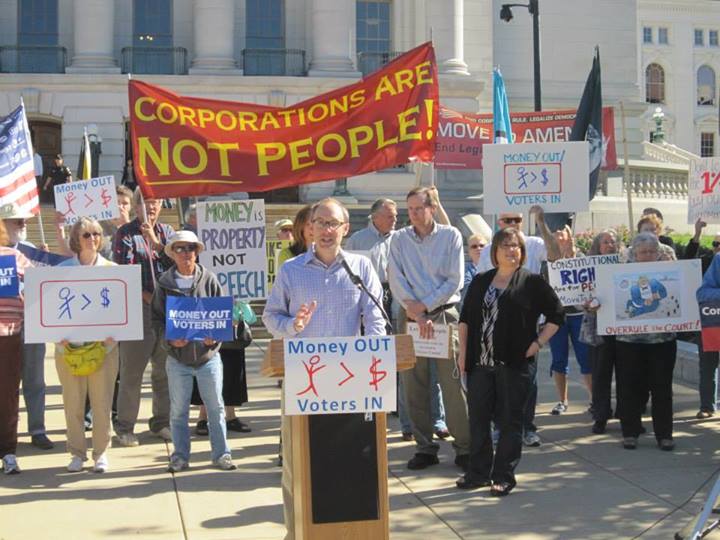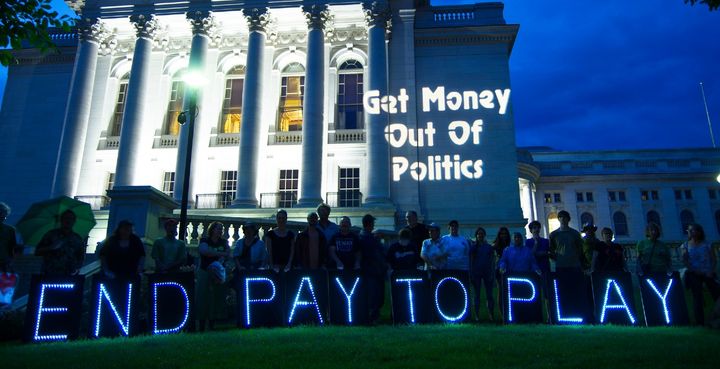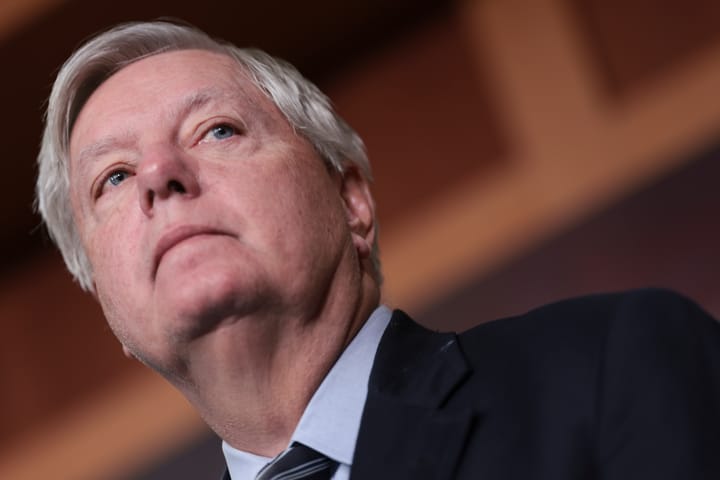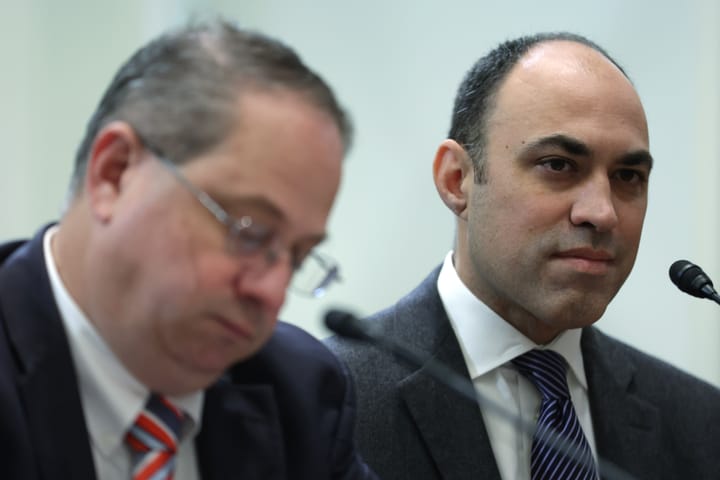The recent election in Wisconsin was unusual in many ways, with voters forced to choose between protecting their health and exercising their rights. But in more than a dozen communities across the state, something that has become increasingly routine took place as voters endorsed resolutions calling for a constitutional amendment to get big money out of politics.
Seventeen communities voted on April 7, by overwhelming margins, in favor of resolutions supporting a constitutional amendment stating that only human beings—not corporations—have constitutional rights and that money is not a form of speech and, therefore, limits on political contributions do not violate the First Amendment.
Such an amendment would essentially overturn past Supreme Court rulings that found campaign finance regulations to be unconstitutional and ensure that the federal government and states can enforce limits on money in politics.
The 17 communities, which all backed the resolutions by 77% or more, are just the latest of the 163 total Wisconsin communities that have endorsed a constitutional amendment.
People are getting it more and more that this is needed, both conservatives and liberals.
George Penn, Wisconsin United to Amend
The effort has been led by Wisconsin United to Amend, a volunteer-led operation that started organizing around money-in-politics reforms shortly after the Supreme Court’s 2010 Citizens United v. FEC decision.
In the Citizens United ruling, the court determined that limitations on election-related expenditures by groups that are independent from candidates and political parties violated the group’s free speech rights, empowering corporations, unions, nonprofits, and wealthy individuals, to spend unlimited amounts of money on political contests. Since the ruling, outside groups have spent at least $4.5 billion on federal races, often dwarfing the amounts controlled by candidates and political parties.
According to Wisconsin United to Amend organizer George Penn, the constitutional amendment has only become more popular in the state since his group has been active.
“We started out in 2013 at about 73% and every year it has gone up. People are getting it more and more that this is needed, both conservatives and liberals,” Penn said. “The average ‘yes’ vote increased from 80% to 81% across the state because we had a record 85% yes vote for the 17 referendums.”
Every community that has voted on the constitutional amendment in Wisconsin so far has passed it, Penn told Sludge.
Wisconsin United to Amend works with other groups in the state to find leaders in communities who can push the resolutions onto their local ballot.
“When we find a champion and we start working with them, we have handbooks on our site that give them all of the details, all of the processes, and all of the forms they need, so we make it easy for them,” Penn explained. “They go to events like farmers markets, county fairs, and anything else they can find to try to get what little they can from local media. They look into what they find most effective, and we just support them with language and whatever they ask us for.”
A National Movement
Article V of the Constitution describes two ways for the Constitution to be amended: an amendment can be referred to the states for ratification by being passed by two-thirds majority of both chambers of Congress, or Congress can be called to hold a constitutional convention by petitions being passed by two-thirds of state legislatures.
While groups like Wisconsin United to Amend make progress at the state level—to date, 20 state legislatures have called for a constitutional amendment, as have over 820 towns, villages, cities and counties—others are working primarily at the national level.
Move to Amend, a California-based nonprofit that says it is “committed to social and economic justice, ending corporate rule, and building a vibrant democracy,” is one of the most prominent pro-amendment groups working to bring members of Congress on board.
“We have used the local resolutions as a pressure tactic, but generally in most states folks have moved directly to pressure of House members,” said Kaitlin Sopoci-Belknap, the national director of Move to Amend.
Currently, a resolution introduced by Rep. Pramila Jayapal (D-Wash.) that calls for a constitutional amendment to address corporate personhood and the regulation of campaign finance has 72 co-sponsors, all Democrats.
Another amendment proposed by Ted Deutch (D-Fla.) has amassed 220 co-sponsors, including one Republican. While Jayapal’s amendment declares the constitution applies only to natural persons and says that governments shall regulate campaign finance, Deutch’s resolution says that Congress and the states “may distinguish between natural persons and corporations” and “may regulate and set reasonable limits on the raising and spending of money by candidates.”
A version of Deutch’s amendment has been introduced in the Senate by Sen. Tom Udall (D-Minn.) and currently has 7 co-sponsors.
The Deutch amendment resolution was introduced with support from multiple prominent good government groups, including Public Citizen, Common Cause, and People for the American Way.

Sopoci-Belknap told Sludge that Move to Amend “had identified a lead to introduce the We the People Amendment in the Senate but [was] working on a group to co-lead introduction right before the pandemic hit.”
Any version of the amendment still has a long way to go before being enacted. While House Democrats voted unanimously for H.R. 1, a sweeping campaign finance bill that includes and expression of support for a constitutional amendment, Republicans have shown very little interest in the issue, besides Rep. John Katko (R-N.Y.) who co-sponsored the Deutch resolution.
Joe Biden, the likely Democratic nominee for president, states on his website that he would “introduce a constitutional amendment to entirely eliminate private dollars from our federal elections.” Biden’s candidacy has been backed by multiple super PACs—a type of political committee formed after the Citizens United ruling that can raise and spend unlimited sums—and his campaign recently endorsed one of the PACs, saying in a statement to reporters that it “is an organization of proven effectiveness and the work they are doing to elect Joe Biden and defeat Donald Trump is absolutely critical.”
While national politicians like Biden send signals and attend bundler-hosted fundraisers, local organizers are continuing their work to build a movement.
“It is our premise that we need to build a bona fide movement for this, like suffrage and civil rights. They are too powerful, it’s going to take a movement,” Penn said. “This is not a Wisconsin movement, it is a national movement, or it is no movement at all.”
Read more Democracy coverage from Sludge:
Dark Money Pours Into Wisconsin Supreme Court Race
Slammed by Trump, Vote-by-Mail Gathers Momentum In States During Pandemic
Seeking Signatures, Ballot Campaigns Face Social Distancing Challenges
ALEC Launches Effort to Protect Gerrymandering from Judges
Opposition to South Dakota Amendment to Regulate Lobbyists Funded by… Lobbyists



